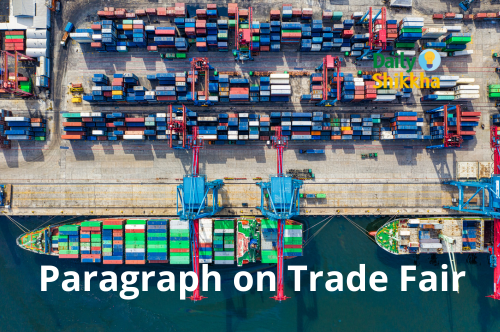The following is a concise Paragraph on Trade Fair. It is crucial to grasp word meanings and understand the material for effective memory retention and meaningful learning. Simply memorizing without understanding may impede true comprehension. So, make an effort to understand the context of the content you are reading.
Paragraph on Trade Fair
Trade fairs, also known as trade shows or exhibitions, are significant events in the world of commerce and industry. They serve as a platform for businesses and industries to showcase their products, services, and innovations to a targeted audience. These events bring together manufacturers, suppliers, distributors, buyers, and potential customers under one roof, fostering networking, collaboration, and market expansion. Trade fairs are organized across various sectors, such as technology, fashion, food, healthcare, automotive, and more, providing participants with the opportunity to gain insights into market trends, competitor offerings, and consumer preferences.
The primary purpose of trade fairs is to facilitate business transactions, both domestically and internationally. Exhibitors utilize these events to launch new products, demonstrate the features and capabilities of their offerings, and negotiate deals with potential buyers and partners. For small and medium-sized enterprises (SMEs), trade fairs offer a level playing field, enabling them to compete with larger players and gain exposure in the market. Direct interaction with customers allows companies to receive immediate feedback, understand market demands, and adapt their strategies accordingly.
Read More: Paragraph on Dangers of Smoking for SSC And HSC
Trade fairs also play a crucial role in fostering innovation and knowledge exchange within industries. Participants can attend seminars, workshops, and conferences held alongside the exhibition, where experts share insights, research findings, and future trends. Such intellectual exchanges stimulate creativity, inspire new ideas, and drive technological advancements in various sectors. Additionally, the presence of international participants promotes cultural exchange and broadens global perspectives.
The economic impact of trade fairs is significant, contributing to job creation, revenue generation, and economic growth. Host cities and regions experience an influx of visitors, resulting in increased demand for accommodation, transportation, catering, and other related services. Local businesses benefit from the surge in consumer spending during the event. Moreover, trade fairs promote investments, as companies explore opportunities for expansion and joint ventures with both domestic and foreign partners.
Trade fairs are also instrumental in enhancing a country’s image and reputation in the global market. Hosting or participating in international trade fairs can position a nation as a hub for innovation, technology, and industry expertise. It provides an opportunity to showcase the country’s economic capabilities, cultural heritage, and potential for investment. As a result, trade fairs contribute to building trade relations and attracting foreign direct investment (FDI).
However, trade fairs also face certain challenges and criticisms. Critics argue that these events can be environmentally unsustainable due to excessive resource consumption, waste generation, and carbon emissions associated with transportation and logistics. Addressing these environmental concerns has become a priority for many trade fair organizers, who are adopting sustainable practices, promoting eco-friendly technologies, and encouraging responsible behavior among exhibitors and visitors.
Moreover, the COVID-19 pandemic presented a unique challenge to the trade fair industry. Many events had to be canceled or postponed, leading to financial losses for businesses and organizers alike. As a response, virtual trade fairs and hybrid models emerged, leveraging digital platforms to replicate the benefits of physical exhibitions while ensuring safety and accessibility.
Read More: Paragraph on Child Trafficking for SSC And HSC
In conclusion, trade fairs play a pivotal role in the global economy, providing a platform for businesses to showcase their products, forge partnerships, and explore new markets. These events foster innovation, knowledge exchange, and economic growth while also presenting opportunities for cultural exchange and international collaboration. However, they must address environmental concerns and adapt to changing circumstances, such as the COVID-19 pandemic, to remain relevant and sustainable in the modern world. Trade fairs will continue to be a vital instrument in driving economic development, promoting industry growth, and advancing global commerce.

